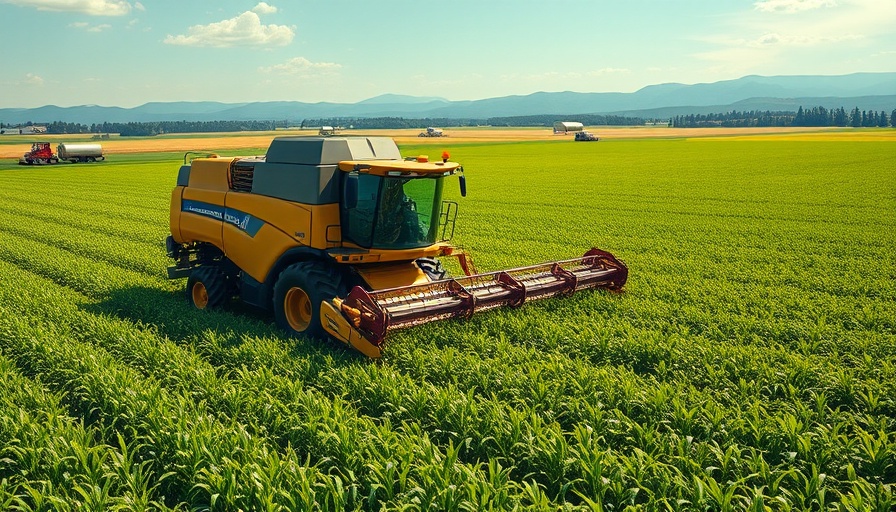
Understanding the Shift: Digital Transformation in Agriculture
The agricultural landscape is undergoing a dramatic overhaul, driven by advancements in technology—commonly referred to as AgTech. From enhanced food production to sustainable practices, the benefits are as impressive as they are numerous. In 2022 alone, $4.6 billion was funneled into agricultural technology, underscoring the urgency for industry stakeholders to stay abreast of these revolutionary trends.
IoT: Revolutionizing Data Collection in Agriculture
One of the standout technologies making waves in agriculture is the Internet of Things (IoT). Farmers can now deploy sensors across their fields to gather real-time data about their crops' health and surrounding conditions. This technology not only boosts productivity but also significantly reduces waste—a pivotal factor in addressing food scarcity issues globally. Imagine being able to monitor soil moisture levels, nutrient content, and even crop health from your smartphone; this is the reality today.
Precision Agriculture: Sensors to the Rescue
Sensors are becoming indispensable in farming equipment as well. They enhance the effectiveness of machinery like tractors by ensuring precise operation. With GPS-based technology, farmers can map their fields better, operate equipment with unmatched accuracy, and even plan efficient routes for planting and harvesting. This precision farming reduces agrochemical usage and resource wastage, while ensuring the farmer operates at maximum efficiency.
Drone Technology: A Bird’s Eye View
Drones represent a transformative power in agriculture. These flying machines provide an aerial view of expansive fields, enabling farmers to assess crop health and identify problem areas potentially affected by drought or pests. Drones can also expedite crop spraying procedures, completing tasks five times faster than traditional methods. As technology continues to advance, we may even see drones equipped for automated monitoring and treatment of crops.
The Rise of Robotics in Agriculture
Across various industries, robots and artificial intelligence have shown their capability in enhancing productivity—and agriculture is no exception. Major companies, like John Deere, are investing heavily in this technology. Recent developments have led to the introduction of robots that can drastically reduce the use of agrochemicals. With advancements such as laser-guided weeding robots, the automation of tedious tasks promises to help farmers work smarter instead of harder.
RFID Technology: Tracking Produce from Farm to Table
As consumers become more health-conscious, tracking the journey of their food from farm to grocery store is gaining importance. Radio-frequency identification (RFID) technology allows for enhanced tracking and ensures transparency in food sourcing. This not only allows consumers to make informed decisions but also helps manufacturers optimize the supply chain, ensuring fresher produce reaches the shelves.
Future Insights: What Lies Ahead for AgTech?
The future of agriculture is bright, brimming with opportunities driven by technology. With the ongoing development of innovations such as vertical farming and hydroponics, urban agriculture is set to thrive. These techniques not only maximize space in urban environments but also contribute to sustainable practices that prioritize health and well-being.
By encouraging community gardens and rooftop farming, cities can foster a culture of sustainability, allowing residents to grow their own food right at home. These initiatives empower individuals, making urban living synonymous with self-sustainability and resilience.
Conclusion: Embrace the Transformation
As technology continues to redefine agriculture, we must embrace these changes to foster a more sustainable future. By engaging with urban farming and embracing new practices, we enhance not only our communities but also our ability to provide for ourselves and future generations. Take the leap, explore sustainable agriculture, and join a community of like-minded individuals dedicated to transforming our cities one garden at a time.
 Add Row
Add Row  Add
Add 




 Add Row
Add Row  Add
Add 

Write A Comment